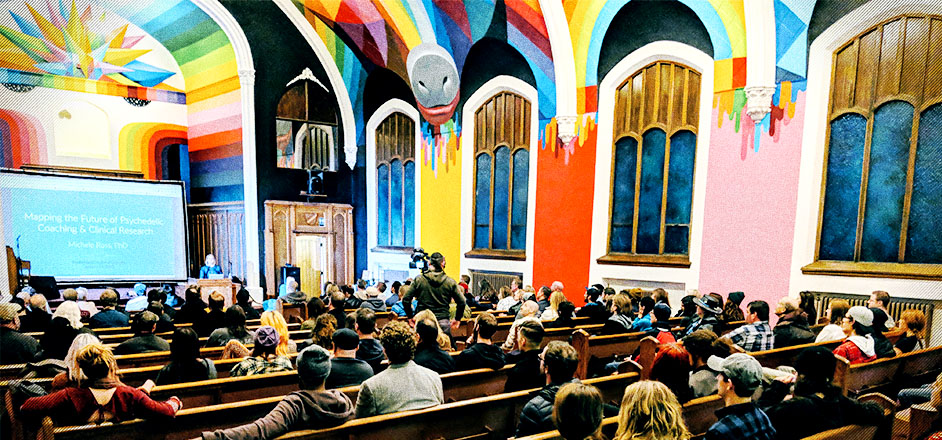The reality TV ride for Michele Noonan Ross was like plenty of others.
On CBS's Big Brother in 2009, the woman with the PhD in neuroscience who seemed sweet and innocent was labeled the villain and got voted off in fourth place.
Yet after the reality TV spotlight fades, a lot of contestants can fall into drugs. A Top Model did meth. Alcohol killed Jackass’s Ryan Dunn. A Big Brother winner abused pills.
After Big Brother, Ross did a few ex-reality star things, too: she went on a Jerry Springer dating show and promoted a nightclub or two.
And then drugs — weed and DMT, specifically.
The odd thing, however, in terms of a reality star doing drugs, is Ross isn't hiding her use from paparazzi. She's not going on Celebrity Rehab. Not dishing to InTouch.
Nine years after Big Brother, she's turning drugs into a career.
"The government calls them substances of abuse," Ross said. "I call them substances of exploration."

Ross is reinventing herself in the public eye as a drug researcher and advocate having written peer-reviewed scientific papers on, for example, how brain changes increase vulnerability to addiction and how cannabinoids might regrow brain cells. For her public outreach, she's focusing not on the drugs that mess you up, but those that might help. She's created a cannabis app, written about how pot is helping women and giving talks on the possibilities of psychedelic drugs like mushrooms and DMT. It seems to be working for her: she asks for $1,000 a speech and has 100,000 Twitter followers — so hungry is the public for information on drugs.
"Psychedelics have amazing properties," Ross said, speaking to a crowd of about 200 folks at the International Church of Cannabis, sponsored by the Psychedelic Club of Denver. "They can open us up."

While most of the public doesn't know anything about them, a few celebrities seem on board with psychedelics: Arian Foster reads books about shamanism, Lindsay Lohan says ayahuasca changed her life and the South Park creators say some of their best ideas come from "acid, acid and, uh, acid." The willingness of public people to be proud of their psychedelic use shows how society views those drugs differently from, say, cocaine or heroin. It's hard to see Keith Richards saying heroin inspired his best songs (even if it did).
Ross herself is a symbol of the world's changing thinking on drugs. Before she became interested in the potential upside, Ross was a Drug Warrior. She said she grew up near a crack dealer. "I really wanted to help the world by ending all drug addiction and making sure all drugs were illegal," Ross said. She did research for the feds on cocaine and mice, writing papers on addiction. "The government loves to find out the ways drugs are bad." But she kept discovering: some drugs have upsides.
Ross said it wasn't easy to talk about drugs in academia in a positive light. "Other researchers think I'm a drug dealer," Ross said. But she kept on.
So where did Ross get the idea to be open with what she knows about drugs? From the drugs themselves.
"DMT told me to step up and educate people about cannabis," Ross said.
Which is how she found herself in the International Church of Cannabis, a building transformed from a dingy hundred-year-old Apostolic church into a psychedelic wonderland, with swirling, technicolor ceilings by famous artist Okuda San Miguel. During Ross's talk, some attendees in the pews stared upward, possibly because of the great art — or else because they were super-lifted. (There wasn't smoking at the event, but this was the International Church of Cannabis, after all.)
Ross is interested in tracking data on illegal drugs, all the informal microdosing, macrodosing, ayahuasca, candyflipping, k-holing, boofing and who knows what kinds of tripping going on every day.
The audience was eager to ask her about drugs. "I just started microdosing shrooms this morning," said a man in the audience named Jimmy who asked that his last name not be used, "how can I help your research?" (She directed him toward her app.) "The more data points we have, the more we'll understand the full effects of these drugs," Ross said.

Many in the audience were impressed with the former TV performer, including Teresa Egbert, the self-proclaimed "hype man" for the movement to legalize mushrooms in Denver. "She's brilliant, and I love that she's scholarly and academic. It's great to see someone who can speak out about psychedelics, and who has that social media presence to get the word out," said Egbert, who said she's been following Ross online. "It's like marketing. You can have the best product in the world, but if no one knows about it, it doesn't matter."
And so goes another reality TV show contestant's journey from the screen to drugs — only it's a happier story than usual this time, one with an upward trajectory.
[Top photo: In front of full pews at the International Church of Cannabis, Michele Noonan Ross lectures on psychedelics and cannabis. Photo by Reilly Capps]



Leave a Reply
You must be logged in to post a comment.